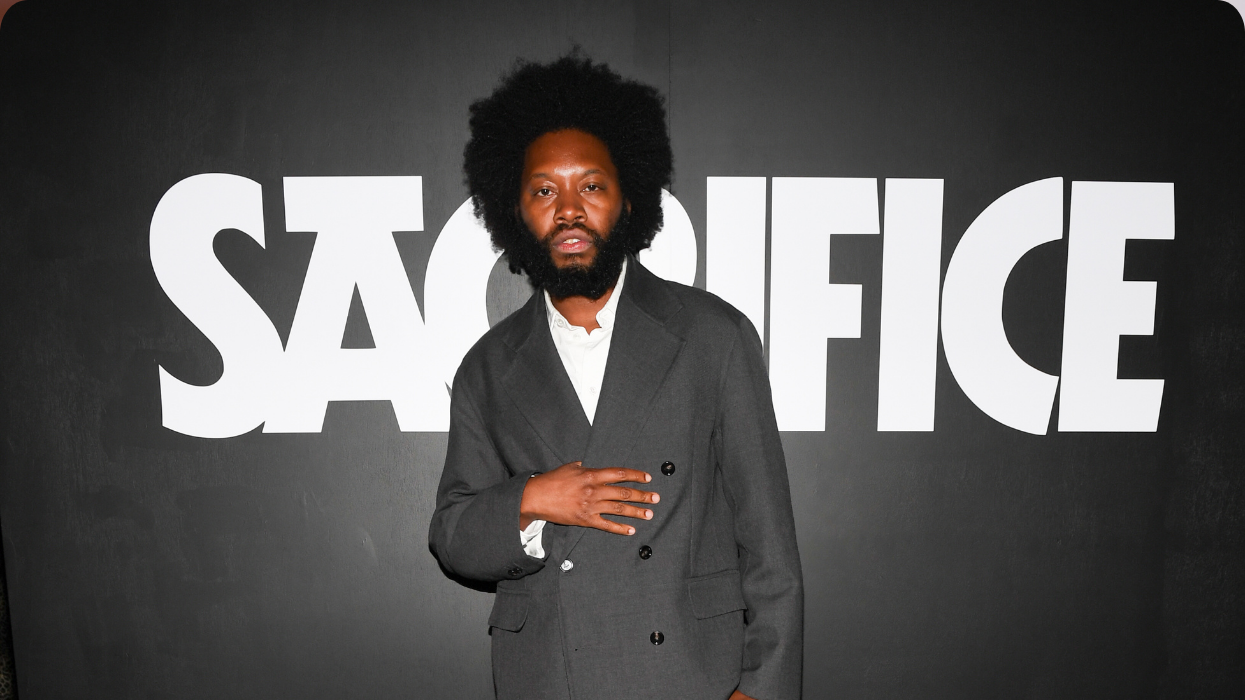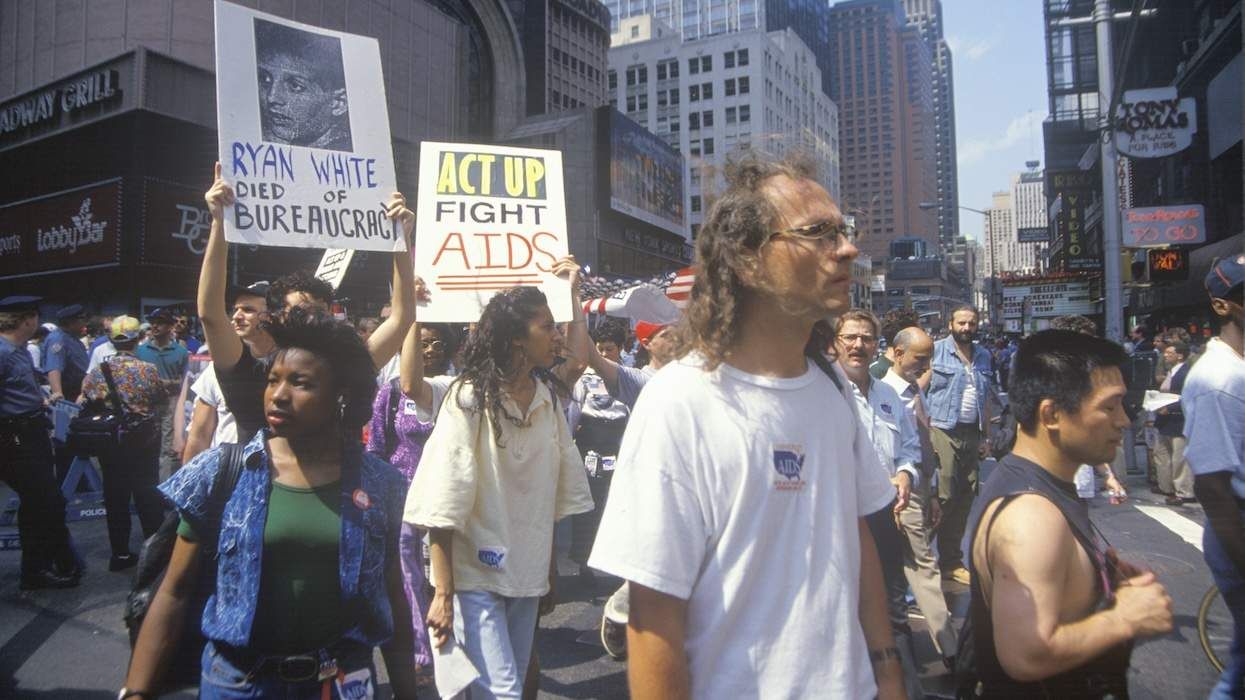My running route takes me north along the Hudson River, turning around just short of the George Washington Bridge. It's 8.2 miles of thoughtlessness. Sometimes.
There are moments when I’m approaching the bridge that I think of Tyler Clementi, and lately, I’ve been thinking about him every day. Tyler was a 19-year-old student at Rutgers University who was caught on a webcam kissing another man and was cyberbullied, and in September of 2010, he jumped from the bridge to his death. I still remember the sting I felt when I heard about Tyler’s death.
It hasn’t gone away after 13 years, which is why I think about him when I see that bridge. I think about my attempts at suicide and how lucky I am to be alive, but I also think about Tyler and what he would be doing now if he were still alive. I think about all the pain, torment, and loss of hope he endured. And I think about how raw we all felt at that time.
When I watched All of Us Strangers, there was an emotional scene in the film that made me think about Matthew Shepard, who was severely beaten, tied to a split-rail fence, and left for dead in Laramie, Wyo. That was 25 years ago.
And more recently, the tragic, heartbreaking death of Nex Benedict.
In the movie, Andrew Scott’s character Adam reflects on the journey of being gay and the inevitable pain that comes with it. Adam says to Paul Mescal’s character Harry, “It’s funny, things are better, of course they are, but it doesn’t take much to make you feel the way you felt back there again, skin all raw.” It doesn’t take much to feel that pain we felt 25 years ago.
I think all of us are feeling our skin all raw again in the wake of the tragic death of Nex, a sophomore at Owasso High School in Oklahoma who was brutally beaten in a school lavatory in February and died the following day. The local medical examiner has ruled Nex's death a suicide. Nex was transgender and used he/him and they/them pronouns.
Nex’s grandmother, who was his guardian, said that Nex had been the subject of bullying for months, and it intensified after Oklahoma’s Republican-led government barred transgender students from using school bathrooms that align with their gender identity. Nex’s family and friends will be haunted for the rest of their lives about this unspeakable act that occurred in a school bathroom that led, eventually, to his untimely death.
Jane Clementi, Tyler’s mom, knows all too well this catastrophic outcome of bullying. Jane started the Tyler Clementi Foundation, an organization dedicated to preventing bullying by advocating for inclusion and acceptance as a way to honor the memory of Tyler.
When I spoke to her soon after Nex’s death, Jane, who lives in New Jersey, said for the most part she can’t escape that daunting bridge, mainly because you can’t live in this area without crossing it. I began by asking her if she’s ever made peace with it.
“There was a long period of time that I couldn't go near the bridge,” she told me. “Finally, about three years later, I went over it, and it was a very anxious moment. Very stressful. I had to just keep saying in my head, It's just a road. And at times when I see it – you can’t help but see it living in this area — it takes my breath away, and it does bring me right back to the place of despair, and the despair that Tyler must have been experiencing.”
After Matthew died, Judy Shepard started the Matthew Shepard Foundation to inspire individuals, organizations and communities to embrace the dignity and equality of all people. To Judy, who still resides in Wyoming, Laramie is becoming a distant memory. “We quit going to Laramie for 99 percent of everything,” she said. “We have friends there and went to many of the university activities, and we were even going to retire there to be close to those activities, but not anymore. We have no desire to.”
Jane said her desire to continue living went away after Tyler’s death. “I just wanted to go to sleep and never wake up again,” she said. “So I kind of could relate to Tyler in a way. It’s like you're disconnected from your inner self in some way. But I knew at some point I had to move on, and do something to try and help.” But make no mistake, Jane’s skin is still raw. I teared up with her during our conversation.
When you speak to Matthew’s mom, you understand immediately that her skin has remained raw for the last 25-plus years. Judy, like Jane, has written and spoken about her son for a long time, but any reminder of Matthew still evokes tears and heartache, and it was palpable during our video call. And there’s no worse reminder than when she hears that someone else was beaten and died because they were queer.
“Sadly, I’m very well aware of people getting attacked for who they are. That's been part of my entire life. It's so pointless, right? You are who you are. Why can't we just accept ourselves as people? Nex’s death is particularly wrenching. Nex was so young and appeared to be so vibrant.”
I was deathly afraid to go into my high school lavatory, not because my classmates knew I was gay – I was years from coming out – but the “heads,” as we called them, smoked cigarettes in those bathrooms, and they were a threatening lot.
I’ve been thinking about that apprehension and how it pales in comparison to what Nex felt when he had to use the bathroom. And how for so many of us who had to endure, and still do, going into a place where, behind walls and stalls, hate flowed more freely out of the public eye. For Nex, that bathroom was unavoidable, and it must have sent shivers down his spine every time he had to enter.
Oklahoma leads the country in anti-LGBTQ+ bills proposed this year, and state legislators and even the person responsible for overseeing the education system spew hate insidiously through public pronouncements, on social media, and on television. And you know who sees all that? The children who beat Nex and who lurk in school lavatories waiting to bully their next queer victim.
Kids who are like Nex are scared out of their minds when they hear someone use terms like “homos” or “queers” or the T word. They know damn well those words are like a match that sets the hate ablaze. What is truly despicable is that this language is allowed to proliferate in some schools and in public discourse, and what is truly tragic is that Nex won’t be the last victim. There are parents around this country who fear for the lives of their children, and that is heartbreaking.
Jane hopes that Nex’s family has the wherewithal to move forward, which can be an unbearable process. “I don’t like to give advice to anyone going through this, but they need time to be able to grieve, and I just hope that they're surrounded by many good people that can take care of them and help them through this terrible journey. I wouldn't wish that on my worst enemy. It's not something anyone should ever have to live through. For me, the pain is there constantly. It never goes away.”
I told Jane that during my runs, I sometimes think about where Tyler might be if he were still alive and had the opportunity to be content with himself without the horror of bullying.
“I can remember a moment — it was only about five years ago — and I was in a bank talking to a young man, and he mentioned something about graduating high school in 2010. And this was a man sitting in front of me with a beard and a deep voice, and I immediately started to think of Tyler as a young person. You know, he was a teen when he died, I guess a man by some standards, but not in my head. He was still a child. And now I meet people that are Tyler's age, and I look at them as older people with their careers and their lives, and it always takes my breath away.”
Judy said she and her husband think about what would have been frequently. “We often see young men who remind us of Matt the way he was, and it makes us wistful, smile even; however, I’ve never wanted to project him into what he would look like now. It’s too hard to even think about that.”





































































Charlie Kirk DID say stoning gay people was the 'perfect law' — and these other heinous quotes